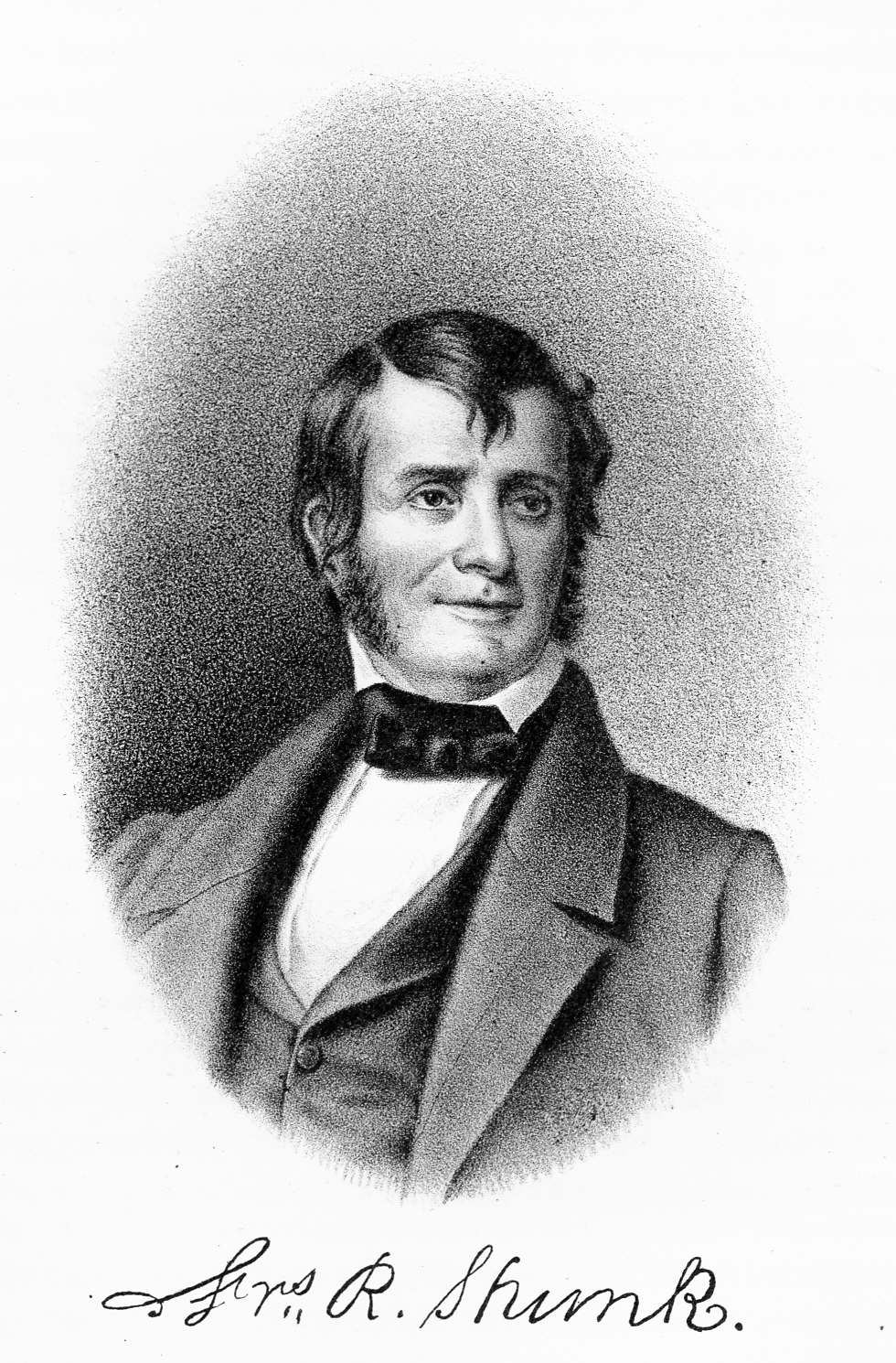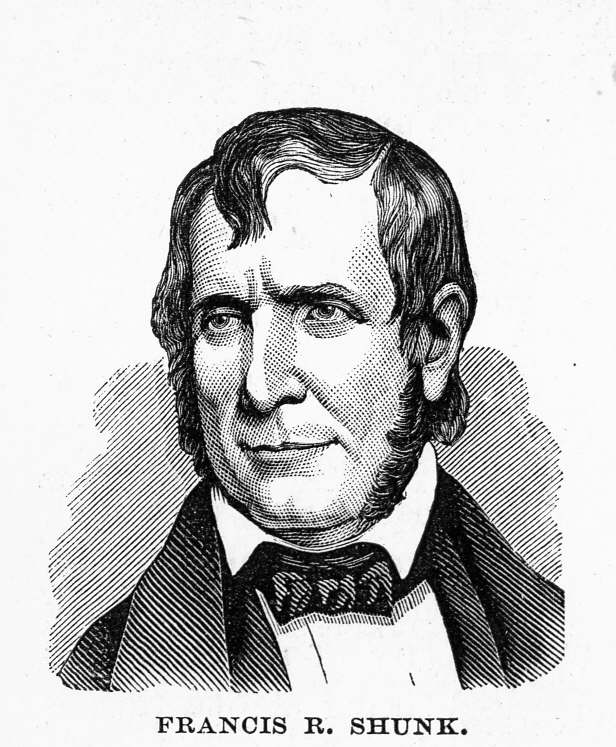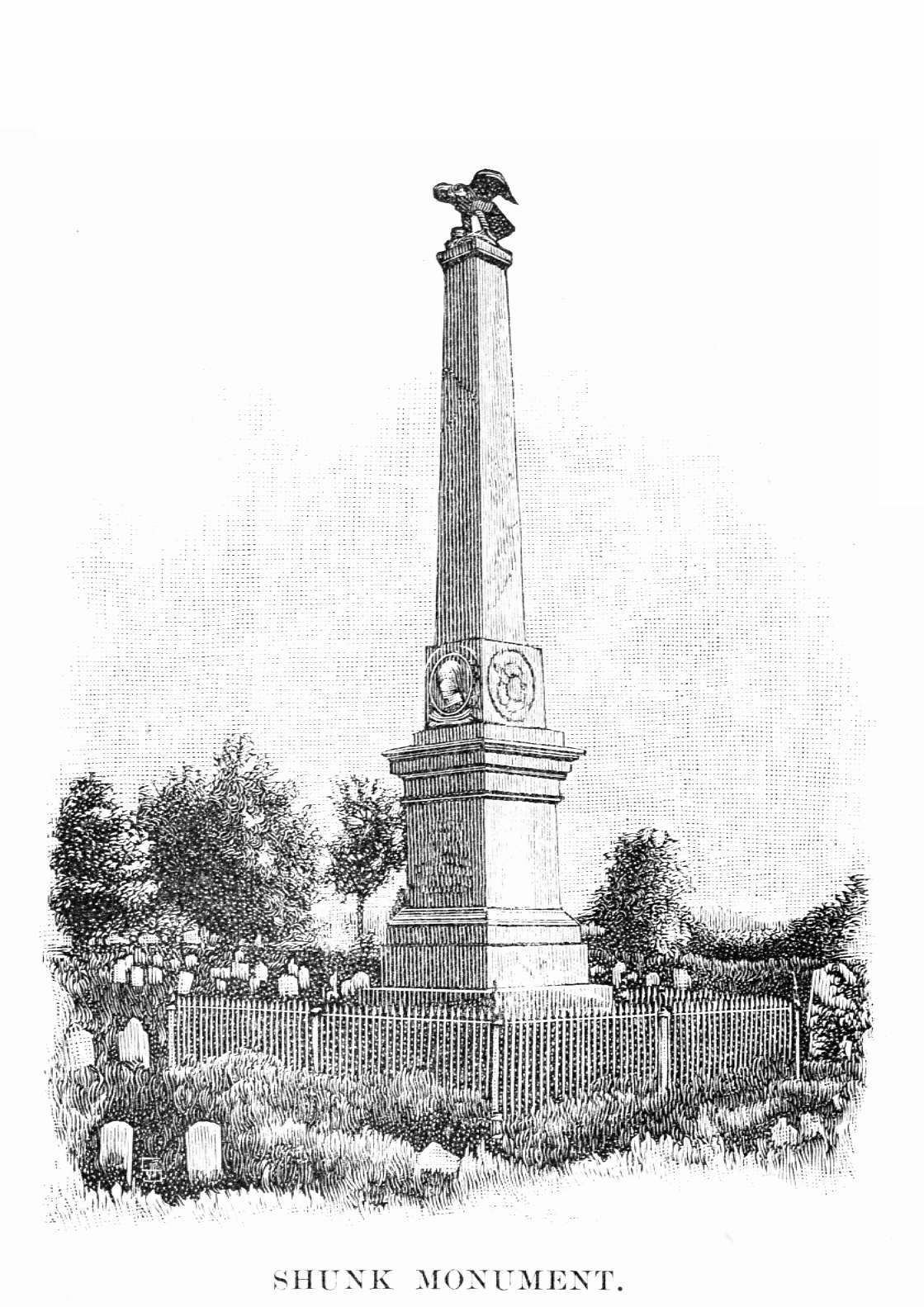Husband Hon. Francis Rawn Shunk 1 2 3 4

Born: 7 Aug 1788 - near Trappe, Montgomery Co, PA 1
Christened:
Died: 20 Jul 1848
Buried: - Augustus Lutheran Church, Trappe, Montgomery Co, PA
Father: John Shunk ( - ) 1 2
Mother: Elizabeth Rawn ( - ) 2
Marriage: 11 Dec 1820

• Additional Image: Francis R. Shunk.
• Biographical Sketch: William C. Armor, Lives of the Governors of Pennsylvania (Philadelphia, PA: James K. Simon, 1873).
To read this brief biographical sketch of his life and career, click here.

• Burial: : Augustus Lutheran Church, Trappe, Montgomery Co, PA.
Wife Jane Findlay 3 4 5
Born:
Christened:
Died: 1878 4
Buried:
Father: Hon. William Findlay (1768-1846) 3 5 6 7 8
Mother: Nancy Irwin (1763-1824) 5 8 9
Children
1 M Francis J. Shunk 4
Born:
Christened:
Died: 15 Dec 1867 4
Buried:
2 M William Findlay Shunk 4
Born:
Christened:
Died:
Buried:
Spouse: Gertrude Wyeth ( - ) 4
3 M Casper Shunk 4
Born:
Christened:
Died:
Buried:
Spouse: Mary Irwin Van Lear (1826-1860) 4
4 M James Findlay Shunk 2 4
Born: 18 Apr 1836 2 4
Christened:
Died: 20 Jan 1874 - Harrisburg, Dauphin Co, PA 2 4
Buried:
Spouse: Rebecca Black ( - ) 4
5 F Nancy Findlay Shunk 4
Born:
Christened:
Died:
Buried:
Spouse: Henry Chapman ( - ) 4
6 F Elizabeth Shunk 4
Born:
Christened:
Died:
Buried:
Spouse: Charles Brown ( - ) 4
General Notes: Husband - Hon. Francis Rawn Shunk
He was born August 7, 1778, and died July 30, 1848. [BAFC, 102]
His parents were not able to furnish the means or spare his time to secure in the ordinary way even the rudiments of an education. Much of his childhood and youth was devoted to manual labor. At the early age of fifteen he became a teacher, and soon after the instructor of the school at the village where he was born. From that time until 1812 he seems to have been employed as a teacher during the few months of the year the school continued, and the rest of the time as a laborer in the pursuits of agriculture. The intervals of toil were devoted to the improvement of his mind in every useful branch of study. In 1812 he was selected by Andrew Porter, then surveyor-general under the administration of Governor Snyder, to fill a clerkship in his department. While thus employed he commenced and prosecuted the study of the law with Thomas Elder, of Harrisburg. In 1814 he marched as a private, with many of his fellow-townsmen, to the defense of Baltimore. Soon after he was chosen first assistant, and then the principal clerk of the House of Representatives, and for many years performed with great fidelity the arduous duties of that office. He was subsequently elected secretary of the board of canal commissioners, and served in that capacity during a period when the condition of our public improvements called for the most constant and strenuous efforts on the part of the commissioners, and rendered the situation of their secretary anything but a sinecure. In 1839 he was chosen by Governor Porter Secretary of the Commonwealth. On retiring from that office he removed to Pittsburgh, and engaged in the practice of the law. In 1844 he was called from his retirement by the voice of the people of the commonwealth to fill the highest office in their gift. He so conducted his administration as their chief executive that he received from them the highest expression of their confidence and regard by being re-elected with an increased majority, and that too against an opposing candidate of the most estimable character, whose exalted virtues and worth were acknowledged by all.
But he had scarcely entered upon the duties of his second term before he became the victim of a disease which in its early progress excited apprehensions in the minds of his friends that it might prove fatal. The Governor himself, though conscious that his disease was deep-seated, yet seemed to cherish with confidence the hope that the vigor of his constitution and the skill of his physicians would eventually restore him to health. It was not until the morning of the 9th of July, 1848, when a severe and copious hemorrhage from the lungs took place, that he gave up entirely the hope of life and felt that his days were indeed numbered. Upon that day, being Sunday, he wrote his letter of resignation,-the last public act of his life.
His professional attainments, especially in the more abstract principles of law, were large, and as a counselor he had few superiors. But he shrunk from the personal collision its practice in the courts involved, and retired from the bar to engage in employments and studies more congenial with his taste.
His administration as the chief magistrate of this commonwealth shows that he was no novice in the great and fundamental principles of government. His state papers indicate that he had deeply studied the questions of policy involving the great interests of Pennsylvania and the country at large, that he had looked at their remote as well as immediate consequences, and contemplated their influence on the progress and advancement of the entire community under the fostering care of our free institutions as well as their adaptation to the mere accumulation of gain. The opinions which these papers contain commend themselves to our attention, not only for the candor with which they are expressed, but for the reasons by which they are sustained.
Our common-school system had a deep hold on the affections of his heart. He knew it had many imperfections, particularly as it was carried into operation in some of the rural districts; he knew it was not accomplishing all that was desirable, but he believed it would yet work its way into the confidence of the people, and be itself the most efficient means of curing many of its defects. He rejoiced in the good it had effected, and with a generous enthusiasm exulted in the good it would effect.